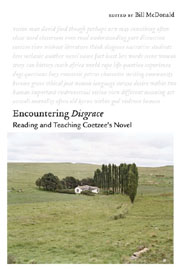Book contents
- Frontmatter
- Contents
- Acknowledgments
- Introduction
- I Reading Disgrace
- 1 “We are not asked to condemn”: Sympathy, Subjectivity, and the Narration of Disgrace
- 2 Beyond Sympathy: A Bakhtinian Reading of Disgrace
- 3 “Is it too late to educate the eye?”: David Lurie, Richard of St. Victor, and “vision as eros” in Disgrace
- 4 Disgrace and the Neighbor: An Interchange with Bill McDonald
- 5 To Live as Dogs or Pigs Live Under Us: Accepting What's on Offer in Disgrace
- 6 Tenuous Arrangements: The Ethics of Rape in Disgrace
- 7 Dis(g)race, or White Man Writing
- 8 Clerk in a Post-Religious Age: Reading Lurie's Remnant Romantic Temperament in Disgrace
- 9 Saying it Right in Disgrace: David Lurie, Faust, and the Romantic Conception of Language
- 10 The Dispossession of David Lurie
- II Reading Disgrace with Others
- Works Cited
- Notes on the Contributors
- Index
3 - “Is it too late to educate the eye?”: David Lurie, Richard of St. Victor, and “vision as eros” in Disgrace
from I - Reading Disgrace
Published online by Cambridge University Press: 12 September 2012
- Frontmatter
- Contents
- Acknowledgments
- Introduction
- I Reading Disgrace
- 1 “We are not asked to condemn”: Sympathy, Subjectivity, and the Narration of Disgrace
- 2 Beyond Sympathy: A Bakhtinian Reading of Disgrace
- 3 “Is it too late to educate the eye?”: David Lurie, Richard of St. Victor, and “vision as eros” in Disgrace
- 4 Disgrace and the Neighbor: An Interchange with Bill McDonald
- 5 To Live as Dogs or Pigs Live Under Us: Accepting What's on Offer in Disgrace
- 6 Tenuous Arrangements: The Ethics of Rape in Disgrace
- 7 Dis(g)race, or White Man Writing
- 8 Clerk in a Post-Religious Age: Reading Lurie's Remnant Romantic Temperament in Disgrace
- 9 Saying it Right in Disgrace: David Lurie, Faust, and the Romantic Conception of Language
- 10 The Dispossession of David Lurie
- II Reading Disgrace with Others
- Works Cited
- Notes on the Contributors
- Index
Summary
In your own Bosom you bear your Heaven And earth, & all that you behold, tho' it appears Without, it is Within In your Imagination, of which this world of Mortality is but Shadow.
— Blake, JerusalemDavid lurie's past is largely a blank slate to readers of Disgrace. We know only a few things about his academic career, and even less about his upbringing, marriages, politics, and religion. We do learn, in a fast-moving paragraph, that David was raised “in a family of women. As mother, aunts, sisters fell away, they were replaced in due course by mistresses, wives, a daughter. The company of women made him a lover of women and, to an extent, a womanizer…. That was how he lived for years, for decades, that was the backbone of his life” (7). Mothers and sisters, aunts and wives, then a little later “tourists” and “wives of colleagues” (7) appear, then immediately “fall away” from our view, with only Rosalind, wife number two, surviving the sentences that created her. We are left largely with surmises: that he received some musical education, went somewhere to graduate school, has taught for something like a quarter of a century, and thought a photograph of his mother as a young woman worth displaying (15). It's hard to imagine him with sisters.
We also know that David wrote and published three books in earlier phases of his academic career. None of them “caused a stir or even a ripple” (4). Though he is “tired of criticism” now, these books that he wrote about “dead people” once commanded his “heart” (162).
- Type
- Chapter
- Information
- Encountering 'Disgrace'Reading and Teaching Coetzee's Novel, pp. 64 - 92Publisher: Boydell & BrewerPrint publication year: 2009

